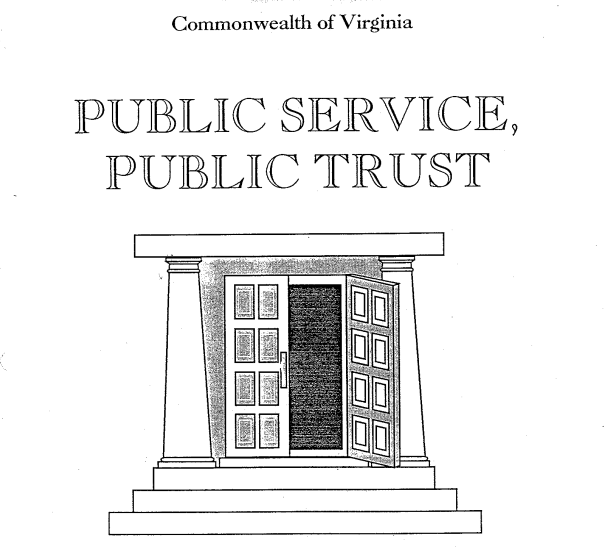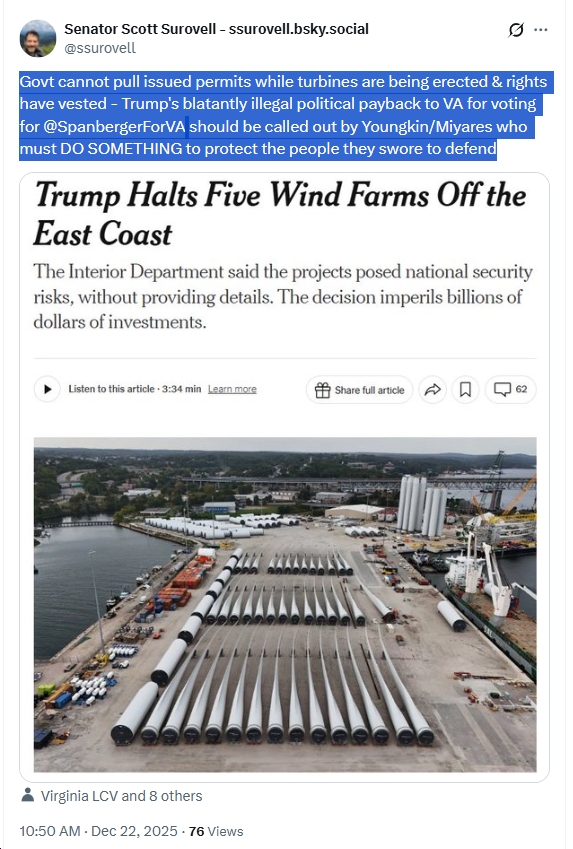Microsoft announced yesterday that Virginia will be the home of “the single largest corporate purchase of solar energy ever in the United States.”
The 315 megawatt (MW) deal, which will cover some 2000 acres with 750,000 panels, is a big deal (“single largest corporate purchase,” after all) and represents over 60% of the planned 500MW capacity Pleinmont project in Spotsylvania County (a few miles south of the Wilderness Battlefield). Pleinmont’s 500MW is:
- “the largest solar project in Virginia;
- equal to the entire amount of solar power currently produced in the commonwealth; and,
- the fifth largest solar project in the country.”
This is a big deal (on multiple levels) as it could move Virginia from straggler to leader in solar deployment. And it explicitly shows that Corporate America sees solar power is the future — even in “cheap electricity states” (like the Commonwealth), traditionally dominated by dirty electricity sources (e.g., coal), where the primary utility is noted for its historical climate denial, abysmal energy efficiency record, and putting roadblocks against renewable energy, and is heavily invested in fossil fuel infrastructure and resources (especially natural gas resources).
Governor Northam’s statement does justice to the power (both in the individual deal and its signal for the future) of this solar deal.
“Today’s announcement demonstrates that Virginia is quickly becoming a global leader in the clean energy industry. When companies like Microsoft invest in Virginia solar, they opt for clean and reliable energy as well as new jobs in the energy economy we are working hard to build. I am proud that Microsoft is expanding its commitment to solar energy in Virginia, and I look forward to building upon this victory for clean energy and the jobs that come with it.”
Yes — a huge Corporation is signing huge solar deals in Virginia giving real boost to the Commonwealth’s clean-energy economy and moves toward a cleaner grid. What could be wrong with that?
Contemplating this announcement (of a deal that does not, to be explicit, directly involve Dominion Power) brought several things to mind:
- The Dominion Subsidy Act, which greatly reduces State Corporation Commission (SCC) oversight and opens the door for serious abuse of provisions related to energy efficiency and clean energy to boost Dominion profitability and risks undermining real progress to a clean energy future, is (overly) lauded for its wording of 5,000 MW of utility-scale solar and wind to be “in the public interest.”
- This one deal is nearly 10 percent of that target, and this one project is over 10 percent of the target.
- Note (update): since this is a deal within the overall market (PJM, the multi-state utility that Virginia is part of), it is not counted against the 5GW target.
- This project was well underway before the bill and this Microsoft negotiation was nearly certainly well advanced before the Bill was passed. Hmmm … what percentage of that five gigawatt target is already baked in?
- Is the 5,000-MW target simply a recognition of what was already happening due to corporate demands for clean, reliable electricity sourcing rather than any semblance of a stretch goal creating new demands moving forward?
- This one deal is nearly 10 percent of that target, and this one project is over 10 percent of the target.
- This 500-MW project matches the existing total solar power in the Commonwealth. The 5,000-MW goal will, in essence, be a total order of magnitude increase. That 5,000 MW is, however, in commercial, utility-scale solar projects which require lots of transmission and distribution (T&D) infrastructure — which is a nice source of Dominion Power ratepayer guaranteed/paid revenue and profits and creates the risk of power disruption due to downed power lines just as with a coal-fired plant (that this solar hopefully is displacing).
- Distributed solar (whether on top of a big box retailer, at your kid’s school, or on your neighbor’s rooftop) does not come with that T&D cost structure and can (especially with the plunging price of storage options) provide emergency power in that “unlikely” event that there is a local power outage.
- Note: Raise your hand if you, as has my household, have already had multiple power outages in 2018 with more than 24 hours without electricity service.
- BTW, when contemplating your hours/day(s) without electricity someplace in Virginia, do take a moment to remember the months that far too many of fellow citizens in Puerto Rico have gone without electricity services and with totally inadequate Federal assistance to restore critical utility services throughout our fellow Commonwealth.
- Writ large, across the United States, roughly two-thirds of total solar power installations are ‘utility’ scale and one-third is distributed projects below 1 MW (with, dependent on analysis, the majority of the total power of distributed being small rooftop installations below 10 kilowatts). The Dominion subsidy bill has a structure to foster a Virginia solar market greatly favoring the utility scale (dominated by Dominion) over distributed generation, roughly on a 9-1 terms. It is quite unclear that this sort of imbalance, relative to what is occurring across the nation, actually better serves the public interest.
- This 500-MW project is part and parcel of that imbalance.
- Distributed solar (whether on top of a big box retailer, at your kid’s school, or on your neighbor’s rooftop) does not come with that T&D cost structure and can (especially with the plunging price of storage options) provide emergency power in that “unlikely” event that there is a local power outage.
To summarize my mixed reaction to the Microsoft announcement:
- YES!
- A clear statement that the Corporate America is pursuing the clean energy revolution within the Commonwealth of Virginia.
- Microsoft sees serious benefits in driving a clean(er), low-GHG energy future. And, so do other Corporations. If the Commonwealth, if the Virginia Government, wants to promote business (like seeking to attract Amazon’s new HQ), making clean-energy ‘easy’ and readily available is a key part of that.
- Huh?
- Wondering … while understanding and lauding the benefits of clean-energy for boosting business and the economy, is this deal yet another indication that, within the structure of the Dominion Subsidy Act, Virginia’s “clean-energy revolution” could occur in an inefficient, large-Corporation favoring/beneficial/focused path that will reduce the real benefits for Virginia’s citizens and economy?
===
to underline
While Microsoft’s solar electrons might go over Dominion wires (unclear, at least to me, whether this will or will not be the case), this deal is in the wholesale market and — in essence — goes around the utility (and utility-rate) structure. It is a strong sign of how solar is ever-more (highly) cost competitive and prized by major Corporate players. It is an indication of how going green (clean energy) can help Corporations make more green (be more profitable). It is a step forward in Virginia’s move to a clean(er) energy future.
The second half of this post are ‘reactions sparked’ by reading the announcement, even as (re the 5GW target, for example) the deal somewhat is to the side of the actual deal.
—- UPDATE —–
After writing this article, I became aware of Advanced Energy Economy’s press release on the project which is worth a read:
Virginia AEE lauds Microsoft’s investment
in 500 MW Solar Project
Firm paves way for other corporate purchasers in sPower project
RICHMOND, March 22, 2018 – Today, Virginia Advanced Energy Economy (Virginia AEE) hailed the announcement by Microsoft Corp. that it would purchase 315 MW of energy from two new solar energy projects being developed in the Commonwealth. The projects – Pleinmont I and II, which will be developed, owned, and operated by sPower, an AES and AIMCo company – will have a total capacity of 500 MW. Both Microsoft and AES are members of Advanced Energy Economy (AEE), a national business organization, with which Virginia AEE is affiliated.
“This announcement is groundbreaking for advanced energy in Virginia,” said Harrison Godfrey, executive director of the business group Virginia Advanced Energy Economy. “Not only will this investment nearly double the amount of installed solar capacity in the Commonwealth, but with it Microsoft and sPower will also provide a new way for other energy purchasers to buy into, and benefit from, the secure, clean, affordable energy these solar facilities provide.”
In this arrangement, Microsoft serves as an anchor tenant for a project but allows other buyers to procure smaller portions of the output at a competitive price. Such aggregation extends access to advanced energy sources for other buyers, unlocking previously latent demand and creating new markets for advanced energy companies.
Virginia currently has 619 MW of installed solar capacity. Solar, and advanced energy more broadly, has been one of the fastest growing sectors of the economy in Virginia and nationwide. According to the latest Solar Jobs Census, released in February, Virginia has seen 10 percent year-over-year growth in solar industry employment. The advanced energy industry employs 81,000 Virginians, working in energy efficiency, wind, solar, and other technologies and services.


















